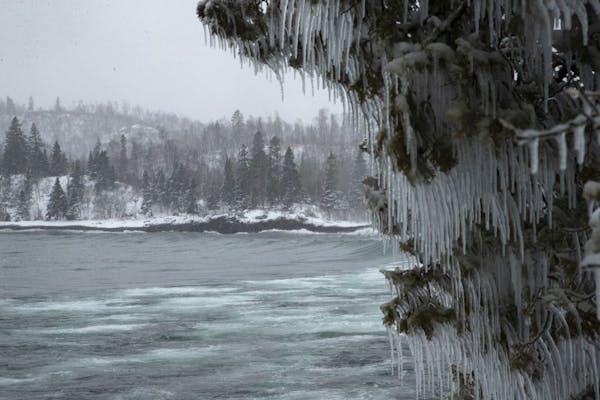DULUTH – It was a busy Saturday for Mike and Chelsea Brandon, who had driven from Eagan to find their next home.
After a blitz of seven viewings, the couple put in an offer on a charmer that checked all their boxes: two-car garage, a deck, and room for their 2-year-old, Lochlann, to play.
"We just live outside, and that's how we want to raise our son," Chelsea said.
"We like camping, the outdoors, the geography of the North Shore here," Mike added. "Just getting out of the Cities."
They'll be back again this weekend — not to move in, but to keep looking.
NORTH REPORT
Sign up for our North Report newsletter

"We competed with three other offers, and the winning offer went in with no inspection," said their agent, Susan Dusek with Edina Realty. "And their house sold this weekend, so they will come up very ready to buy."
More buyers from the Twin Cities and other metro areas are relocating to Duluth as work-from-home options become permanent and the appeal of the outdoors lures younger buyers. Not to mention rock-bottom interest rates.
"There has been a huge influx from urban areas around the country, since so many people are working from home now," said Doug Kman, president of the board of Lake Superior Area Realtors. "Other people are coming with concerns over climate change, and we have kind of a refuge in Lake Superior."
All of which adds fuel to an already-hot housing market that has grown increasingly competitive every year since 2012, Kman said. Median home sale prices hit a record high in Duluth this summer — $210,000 — as demand kept increasing and the number of homes on the market remained low, driving some out-of-town buyers to put offers on homes before setting foot in them.
That's despite unemployment rates higher than they have been in decades after layoffs across several industries and a slow-to-rebound tourism sector. Even so, local real estate activity is expected to continue its unprecedented surge into the fall, with many hoping more homes hit the market before the snow falls.
"I'm wondering if there are some sellers who have been holding out due to the pandemic," Kman said. "I think this winter has the potential to be the hottest winter real estate market ever."
Tough to buy
It's a seller's market and will remain so, local Realtors say.
"With the pandemic there's an inventory shortage in a market where we already had an inventory shortage going on," said Gage Hartman with Real Living Messina & Associates. "It's tough for buyers. I find myself consulting them, saying there's a high likelihood you find a house you love and your offer may not get accepted."
There were fewer houses on the market in the Duluth area this summer than any previous summer in at least 15 years, according to Lake Superior Area Realtors data.
At the same time, the number of closed sales hit a 15-year peak in July.
"Some clients in Minneapolis aren't able to get to Duluth soon enough," Hartman said. "Sometimes they'll put in an offer sight unseen and will be seeing it for the first time during the home inspection."
It's not all bad news for buyers. With interest rates at historic lows, buyers can get approved for bigger loans without monthly costs rising much.
On the downside, that will raise home prices while wage growth is expected to remain flat.
Tough to build
Working from home is expected to remain an option for many businesses after the pandemic has subsided, according to the Harvard Business Review, and a Gallup poll found nearly 60% of employees who worked remotely this year would prefer to continue doing so.
Buyers looking for that perfect work-from-home setup will find a lot to love in Duluth's aging housing stock, much of which was built before open spaces became the norm.
"I've been doing this for 25 years and until now everyone wanted open, open, open," said Dusek. "Now it's too noisy, we need more defined space for Zoom calls — Duluth is full of old houses that are more compartmentalized."
About half of Duluth homes were built before 1950, more than twice the state average. Barely 2% were built in the past decade.
Duluth is an expensive place to build new houses, in part because so many small parcels are already built out, and because the ancient rocky hillside on which it sits poses unique challenges. There are also few speculative developments as seen in fast-growing markets like Fargo-Moorhead and St. Cloud.
"Larger lot sizes, topographical obstacles, and a lack of demand for large developments at scale all cause direct and indirect increases in home construction prices, in turn driving up the cost of new homes," concluded a 2018 housing cost study by Northspan Group, a business development nonprofit, which also found Duluth charges considerably higher fees compared to other cities roughly its size.
New homes typically run $300,000 and up in Duluth, well above prices for older, similar-sized homes or for new construction in parts of the Twin Cities.
The Rebuild Duluth initiative, in which the city gives away free land to creative designs for infill projects, was launched last year to bring the cost of new homes down.
The first round was considered a success, and more properties are being collected to give away for the next round of projects.
For any relief for home buyers in Duluth, Realtors agreed that new housing needs to be part of the answer, especially if the city's population starts growing for the first time in decades.
"We just don't have the inventory," Dusek said. "So where are they going to go?"


![Kathy Cargill's home in Duluth's Park Point neighborhood. Cargill's limited liability company has purchased more than 20 parcels on the point. ] JANA](https://arc.stimg.co/startribunemedia/BTNQVSCQD5GQLP6YRUSBSH6FQM.jpg?w=75&h=75&fit=crop&crop=faces)



